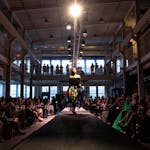On paper, a stripped-down Oscars seems about as appealing as celebrating your wedding anniversary at White Castle. But the team behind Sunday's ceremony did an impressive job under bizarre circumstances, inviting viewers into an intimate dinner party mere mortals never get to crash.
Truth is, the Academy Awards have been draining the hoopla out of their big bash for years, scrapping big-ticket hosts, bombastic musical numbers and lengthy salutes to legends. Sunday's was even more low-rent, thanks to the pandemic.
The show began with a tracking shot of Regina King entering L.A.'s Union Station, a frequent film location set up for cabaret seating. It could have been a nod to the very first Academy Awards, a brief affair at the Roosevelt Hotel, although it was more evocative of a suburban nightclub than a swank hotel.
Upon hitting the stage, King tripped — then regained her balance with a nod to the Derek Chauvin trial: "If things had gone differently in Minneapolis, I might have traded in my heels for marching boots." Later, Marlee Matlin gave a shout-out to Darnella Frazier, the Minnesota teen who captured George Floyd's death on her phone.
From the outset it was clear that the producers, including director Steven Soderbergh, weren't going to play by the rules. Winners never got cut off by house DJ Questlove, who relied on pretaped music from his band, the Roots.
Lifting the time limit paid off when Thomas Vinterberg, director of international film winner "Another Round," wrapped up a rambling speech by dedicating the victory to his daughter, Ida, who died four days into shooting. Supporting-actor winner Daniel Kaluuya punctuated his lengthy thanks with a moving tribute to Fred Hampton, the Black Panthers leader he portrayed in "Judas and the Black Messiah."
Rather then reading lame jokes off teleprompters, presenters often shared anecdotes from their love affair with the movies. Laura Dern spoke of each supporting-actor nominee with such intimacy, she might as well have popped by their tables and given them fist pumps.
The usual order of awards also went out the window. In the most unexpected switcheroo, the best actor winner was announced last, presumably so the evening would end with a tribute to the late Chadwick Boseman. That move backfired when the award went to an absent Anthony Hopkins.
Performances of best-song nominees were relegated to the "Spotlight" pre-show. The highlight: H.E.R. singing the eventual winner, "Fight for You," with a masked dance troupe and banners declaring Power to the People.
All the tweaks and twists didn't necessarily eliminate boredom, but Sunday's event clocked in at 3 hours and 15 minutes — 25 minutes shorter than the average over the past five years.
It's possible the Oscars could have been more irreverent, an approach the Emmys used with some success last year. But the film academy has never been very good at loosening up — a fact that producers seemed to forget when they shoehorned in a bit late in the show in which Glenn Close revealed that she was intimately familiar with a song called "Da Butt."
Aside from her cringe-inducing dance, the proceedings remained regal — but with a side of sliders.






